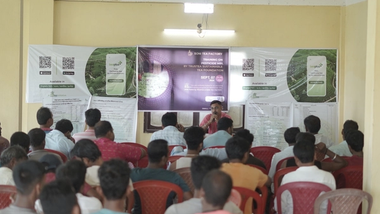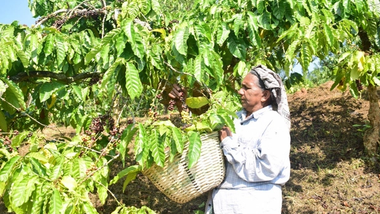Smallholder farmers are estimated to produce up to a third of the world’s food and crop production.[a] This includes some of our most important raw materials used in our brands.
Yet despite their vital role within our supply chain, many smallholders face systemic barriers that limit their livelihoods, including challenges in accessing finance, agricultural training and new markets.
That’s why we’re supporting smallholders through regenerative agriculture and livelihood programmes that improve their economic opportunities and strengthen the resilience of their farms. This not only supports farming communities but also helps secure a stable and sustainable supply of key ingredients for our business.
Collaboration is key to supporting smallholders
The local partners we work with are critical to the success of our smallholder programmes. They bring hands-on experience in crop management and training, along with expertise in community development, youth engagement and gender equality, helping us embed these principles across our livelihood programmes.
Working together, we’re developing tailored initiatives that meet smallholder needs such as certification schemes and regenerative agriculture programmes that support farmers to sustain and improve yield and income diversification. Below are some examples of how we are making a difference for the smallholders producing our crops.
Supporting tea farmers in India
Through our trustea certification programme, we’re helping small tea growers who supply crops to certified Bought Leaf Factories for local Indian brands to meet sustainability standards and improve their yields. The farmers are trained in cultivating climate-resilient tea and gain access to trustea’s digital tools that promote good agricultural practices. Certification opens new markets, offering opportunities to increase income and long-term stability.
Our programme aims to promote sustainable farming, expand sustainably produced tea, and strengthen smallholder integration into supply chains.

Increasing climate-resilient coffee farming in India
We source most of our coffee beans from farmers in Karnataka and Kerala. And we’re working with them to future-proof their farms by increasing their climate resilience. Through our programme, smallholders learn regenerative agriculture practices including natural fertiliser use, water conservation and intercropping with spices and fruits. These methods have the potential to restore soil health, reduce emissions and improve crop yields, while optimising production costs. We’re also strengthening market connections to support better prices and more stable income. The programme also supports farmer livelihoods by diversifying incomes and empowering women farmers.
The programme further tackles social barriers by training women as field facilitators who work directly with smallholder farmers. They offer hands-on crop management training and engage local communities with our livelihood programmes. This supports women in taking leadership roles in farming and decision-making.

Regenerative tomato value chain development
In collaboration with IDH, Sahyadri Farmers Producer Company and local partners, we support around 3,000 tomato farmers with regenerative agriculture practices that restore soil health, boost biodiversity and build climate resilience.
Through tailored training, model farms, and peer learning led by champion farmers, it helps reduce input costs, increase yields, empower women, and improve market access—ultimately driving sustainable livelihoods and environmental stewardship.
Key livelihood activities include tailored training in regenerative techniques and ongoing technical guidance, with model farms showcasing actions like biodiversity enhancement and reduced chemical inputs. Lead farmers act as local champions, encouraging peer learning and village-wide adoption. Monitoring systems track soil health and outcomes to help farmers improve productivity, reduce costs, and enjoy more stable, sustainable incomes.

Mapping Unilever programmes around the world
Unilever’s interactive map shows the breadth of programmes supporting smallholder farmers around the world. Click to explore how we are strengthening livelihoods, regenerating ecosystems and making our sourcing more sustainable in India.
Click to read more about our work on protecting and regenerating nature.
